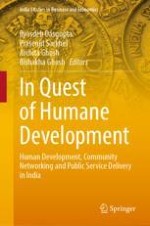2022 | OriginalPaper | Chapter
3. Eleven Theses on the Humanization of Development: ‘Praxis Philosophy’ in World of the Third
Authors : Anup Dhar, Anjan Chakrabarti
Published in: In Quest of Humane Development
Publisher: Springer Nature Singapore
Activate our intelligent search to find suitable subject content or patents.
Select sections of text to find matching patents with Artificial Intelligence. powered by
Select sections of text to find additional relevant content using AI-assisted search. powered by
